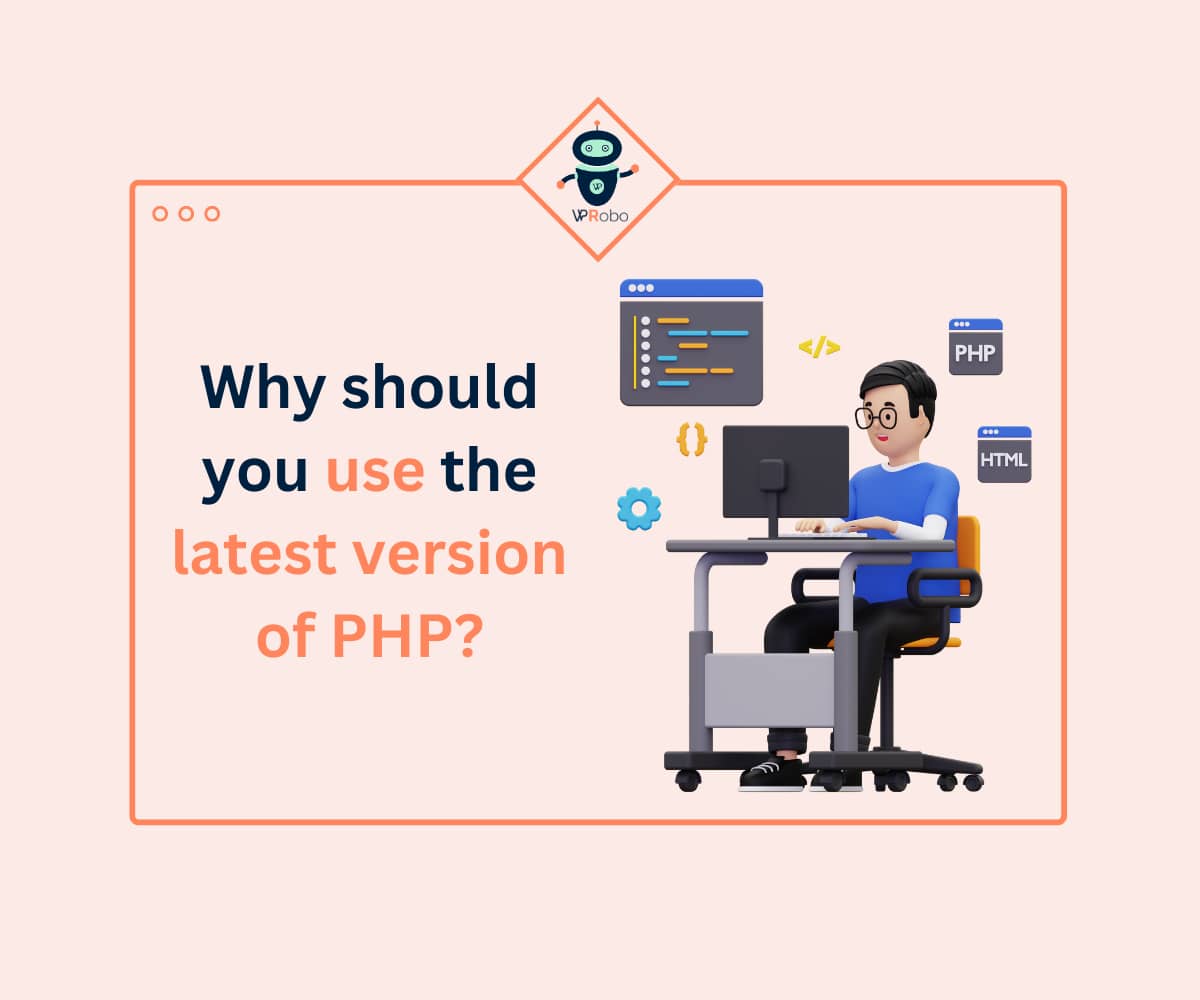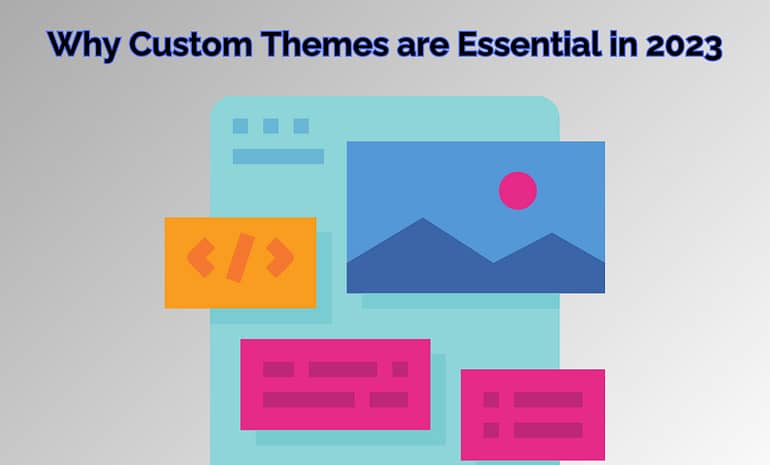Why should you use the latest version of PHP?
Hypertext Preprocessor, or PHP, is a server-side programming language mainly used for building websites. it is one of the most widely used programming languages in the world and has a sizable developer community and an extensive number of frameworks and tools. The language is continually changing, and new versions are issued on a regular basis, each with new features and enhancements. In this article, we will explore the benefits of using the latest version of PHP.

Improved Performance:
When it comes to web-based applications, performance is an important consideration. A lagging website might result in a bad user experience and lost visitors since users demand quick-loading pages and seamless interactions. Utilizing the performance enhancements and optimizations that come with each new edition of PHP is one of the primary reasons to use the most recent version of PHP.
For instance, Zend Engine 3 was added to PHP 7 and offers better memory use and speed than the engine that was utilized in PHP 5. This results in faster script execution and reduced memory consumption, which can improve the overall performance of your web applications. Additionally, PHP 7 also introduced support for scalar type declarations, which enables better optimization by allowing the PHP engine to make more informed decisions about the underlying data types used in your code.
Better Security:
Security is a top priority when building websites, and PHP is no exception. Every time PHP is updated, security features are added to strengthen the language’s defenses against different kinds of assaults. For instance, Argon2—a new cryptographic method that is more secure than earlier ones and offers a stronger defense against password cracking attacks—was introduced in PHP 7 along with a number of other new cryptographic algorithms.
Additionally, PHP 7 replaced certain previous, less secure capabilities, such as the MySQL extension with the more secure MySQLi extension, and terminated support for them. Your online applications become less exposed to vulnerabilities as a result of the elimination of these less secure elements, which helps to decrease their attack surface.
New Features:
New features and enhancements are added to PHP with each new release, making it simpler to write code and create online applications. For instance, PHP 8 contained a number of new features, including the capability to utilize named parameters in function calls, which enhances code readability and lowers the possibility of mistakes brought on by misplaced arguments. Additionally, PHP 8 added attributes, which are a mechanism to annotate classes, methods, and functions. This can be used to add information about how the code should behave or to provide additional context to developers.
Another new feature in PHP 8 called union types offers additional flexibility when working with complicated data types. To indicate many potential types for a variable, parameter, or return value, use union types. This can help you write less code to handle various data types.
Better Compatibility:
Your online applications will be compatible with the most recent web technologies and frameworks if you use the most recent version of PHP. For instance, a lot of well-known PHP frameworks like Laravel and Symfony demand PHP 7 or later. It may be more difficult to create web applications that adhere to the most recent standards if you use an older version of PHP since you won’t be able to use the most recent features and enhancements in these frameworks.
Using the latest version of PHP also helps ensure that your web applications are compatible with the latest versions of web servers and operating systems. For example, PHP 8 includes support for the latest version of the Apache web server and several new operating systems.
Support and Maintenance:
You can be sure that you have access to the most recent support and maintenance by using the most recent version of PHP. You can count on the most recent version of PHP to get regular updates, bug fixes, and security patches because of the sizeable PHP community and the active support and maintenance given to new versions. By keeping your online apps safe and up to date, you can protect the data of your users and the reputation of your company.
Easier Maintenance:
Web application maintenance may be difficult, especially as they get more complicated. By giving users access to new tools and features that streamline the maintenance process, the most recent version of PHP may facilitate this effort. For instance, a new JIT (Just-In-Time) compiler was added to PHP 8 that can enhance performance and lower memory use for specific application types. By giving you information about how the PHP engine is operating your code, the JIT compiler may also make it simpler to optimize and maintain complicated code.
Another example is the addition of static return types in PHP 8, which can help make code easier to maintain and debug. Static return types allow you to specify the exact data type that a function returns, which can help prevent errors and make it easier to track down bugs.
Better Error Handling:
Web development must include the handling of mistakes, and PHP offers a number of techniques for doing so. The methods in each new version of PHP have been improved, which can make error handling simpler and more effective. For instance, the null coalescing operator, which was added to PHP 7 as a new operator, can make handling errors simpler by supplying a default value for variables that might be null.
Additionally, PHP 8 included a number of additional error-handling enhancements, such as the ability to throw exceptions from the __toString() function, which can facilitate the detection and management of string conversion-related issues.
Better Debugging:
Web development must include debugging, and PHP offers various ways for doing so, including error reporting and logging. Improvements to these methods are made in every new release of PHP, which can make debugging quicker and more effective. For instance, PHP 7 introduces the spaceship operator, which can aid in code simplification by offering a clear method of value comparison. The spaceship operator offers a straightforward method to establish the relative order of values, which can facilitate debugging.
Additional new debugging capabilities offered by PHP 8 include the capacity to add properties to functions and classes. Debugging and maintenance can be facilitated by using attributes to offer more details about how functions and classes should behave.

Are you experiencing issues with your current PHP setup or looking to upgrade your website’s PHP version? Our experienced team at WPRobo can provide reliable PHP support and maintenance services to keep your website running smoothly and efficiently. We also ensure that your WordPress website is running on the latest version of PHP, so you do not need to spend time researching or performing updates yourself. As mentioned earlier, using the latest version of PHP can offer several benefits, such as improved performance, better security, new features, and easier maintenance. Our team takes care of the technical details of updating PHP by automatically checking for updates and performing the updates in a safe and efficient manner.
In addition to updating PHP, we also help our clients with other WordPress maintenance tasks, such as updating WordPress core, themes, and plugins. This can help ensure that the website is running smoothly and securely, without the need for manual updates.



